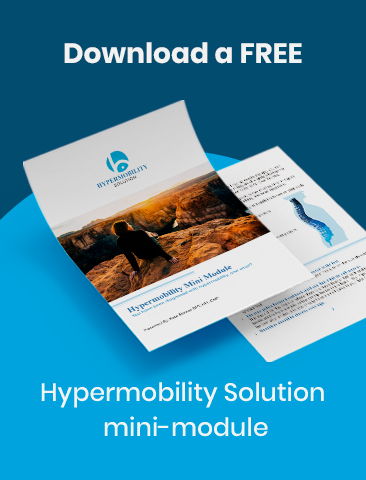I recently came across an interesting research article that discusses the relationship between Hypermobility and the vagus nerve
If you have been diagnosed (or suspect you have) hypermobility or another disorder that involves chronic pain, you are most certainly familiar with inflammation.
Read on the summary of this review article and get the key takeaways on how your vagus nerve function can support or negatively impact your overall health.
Title of the article
VAGUS NERVE AS MODULATOR FOR THE BRAIN-GUT AXIS IN PSYCHIATRIC AND INFLAMMATORY DISORDERS
Reference
Breit, S., Kupferberg, A., Rogler, G., and Hasler G. Vagus nerve as a modulator of the brain-gut axis in psychiatric and inflammatory disorders. Frontiers in Psychiatry 9, 44 (2018). https://doi.org/10.3389/fpsyt.2018.00044
Summary of the article
This is a review article on the vagus nerve, which is the main component of the parasympathetic nervous system. It reviews the relationship between Hypermobility and the vagus nerve.
As stated in the article, the vagus nerve is closely related to the control of mood, immune response, digestion, and heart rate. It is one of the connections between the brain and the gastrointestinal tract.
The article reviews the various functions of the vagus nerve and their relation to psychiatric and gastrointestinal disorders. Since vagal tone is correlated with the ability to manage stress responses and can be influenced by breathing, its increase through meditation and yoga contributes to resilience and control of mood and anxiety symptoms.
Some of the key conclusions from the article are:
- The vagus nerve runs from your brain to your gut and back up in BOTH directions.
- It runs through your neck and controls most of the muscles for swallowing and talking.
- It supports the heart to decrease heart rate.
- In the intestines, it controls muscle contraction and gland secretion to increase motility.
- It regulates internal organ functions such as digestion, heart rate, respiratory rate, reflexes such as coughing, sneezing, swallowing, and vomiting.
- Animal studies show the capacity of the vagus nerve to regenerate.
- The vagus nerve has inflammation sensing and suppressing functions.
- The vagus nerve stimulation is used routinely in the treatment of epilepsy and other neurological conditions.
- Gut microbiota is essential to the immune and nervous systems function. Growing evidence suggests nutritional components such as probiotics, gluten, and drugs have a high impact on the vagus nerve activity through interaction with the gut microbiota but varies by individual.
- Emerging research suggests probiotics may decrease stress-induced inflammatory responses.
- Mindfulness-based stress reduction, slow breathing, and long exhalation phases lead to an increase in parasympathetic tone, this includes yoga.
- In Inflammatory bowel disease, the mucosal immune system remains activated. The vagus nerve can decrease the inflammatory response by reducing the production of proinflammatory cytokines, and research shows vagus nerve stimulation to be helpful for colitis, and Rheumatoid arthritis
- Chronically elevated cytokines have been shown to lead to depression because they can reduce serotonin levels.
What this study means to you:
You must monitor your internal state to control your physical health. Most of the time, these two go together, and it’s a connection that works both ways. Your physical health can affect your internal or mental state, but your mental state can also impact your physical condition.
This article also highlights the importance of eating a nutritional diet, meditating, and deep-diving into stress management techniques as complementary approaches to regular treatment, i.e., physical therapy, chiropractic, and massage, among others.
If you have multiple issues, including depression/ anxiety, digestive problems, difficulty swallowing, hoarseness in your voice, and autoimmune issues, you may want to look at and support your vagus nerve.
Limitations and Considerations of This Study:
This study is a review of the current research information available
The enteric nervous system also controls and activates the bowel. There is overlap with other nerves for control of these critical structures. The vagus nerve is not the only nerve involved.
Vagus nerve stimulation is an invasive procedure currently considered for acute neurologic disorders only.
Your Take-Home Summary:
The vagus nerve is essential to the brain-gut axis, and there’s a relationship between Hypermobility and the vagus nerve. It plays an important role in controlling inflammation, maintaining intestinal function, hunger, energy levels, heart rate, swallowing, and talking functions.
We need to watch and protect our vagus nerve with good nutrition, probiotics, mindfulness, and stress management strategies. It may be playing a more significant role in your overall health than you realize.
![]()




